Background
In recent years, Manchester City Council has made two major commitments that have connected young people in the region with saving the planet and have united to propel the Climate Change Champions project to the top of the agenda.
Firstly, in July 2019, the Council declared a Climate Emergency. In their subsequent plan to attack the goal of decarbonisation, the council set a target to reach zero carbon by 2038, which means reducing direct emissions by 95%.
Alongside this, Manchester is a candidate for Unicef Child-friendly City; adopting Article 12 which explicitly emphasises ‘the right for children to be taken seriously’. With this in mind, the council is keen to respond to feedback from young people and children and incorporate their suggestions into policies. As an illustration of this commitment, Manchester City Council took seriously the recommendations made by over 20,000 young people who voted in the annual ‘Make Your Mark‘ youth ballot; two main concerns they voted for were a curriculum that prepares them for life and the sustainability of the planet.
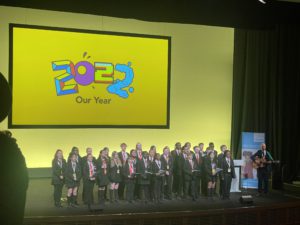 This has led to a number of innovative initiatives, such as Our Year 2022, which was a drive to put young people at the heart of Manchester’s future, and Manchester Youth Council’s proposal to embed the Climate Wheel and Skills to Save the Planet in young people’s learning.
This has led to a number of innovative initiatives, such as Our Year 2022, which was a drive to put young people at the heart of Manchester’s future, and Manchester Youth Council’s proposal to embed the Climate Wheel and Skills to Save the Planet in young people’s learning.
Skills for Life and Climate Change Champions
Along the same lines, the council introduced the Skills for Life programme and the Climate Change Champions as two of their responses to satisfy these requests from young people.
 The Skills for Life framework promotes 5 key skills for all school children in the borough to develop through Kloodle; Communication, Problem Solving, Self-Belief. Self-management and Teamwork. A climate change workshop is an example of a “skills building” opportunity where there are activities which young people can participate in and awards to recognise the development of these skills.
The Skills for Life framework promotes 5 key skills for all school children in the borough to develop through Kloodle; Communication, Problem Solving, Self-Belief. Self-management and Teamwork. A climate change workshop is an example of a “skills building” opportunity where there are activities which young people can participate in and awards to recognise the development of these skills.
The Climate Change  Champions movement pledges to make Manchester a carbon free city. It gives young people the chance to grow their knowledge and confidence in the science behind climate change and empower them to lead sustainable contributions to achieving the zero-carbon target in their own communities. This will allow them to not only to take action on reducing their own emissions and carbon footprint, but also to talk to others meaningfully and persuasively about the climate crisis.
Champions movement pledges to make Manchester a carbon free city. It gives young people the chance to grow their knowledge and confidence in the science behind climate change and empower them to lead sustainable contributions to achieving the zero-carbon target in their own communities. This will allow them to not only to take action on reducing their own emissions and carbon footprint, but also to talk to others meaningfully and persuasively about the climate crisis.
The CCC Events for Schools
In order to promote the Climate Change Champions to young people in the region, Manchester Council holds regular events for schools near the city centre; this one was at The Wythenshawe Forum in Manchester.
Four schools with a group of pupils attended the event; three primary schools and one high school:
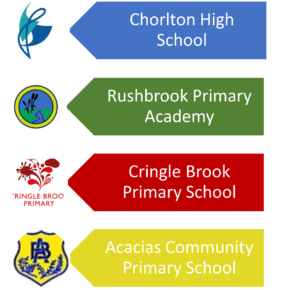
Road Safety Week
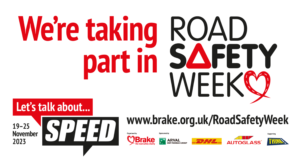 The emphasis for this particular session linked to climate change was on Road Safety.
The emphasis for this particular session linked to climate change was on Road Safety.
The clear message was: “Any amount of pollution can be damaging to our health, but the more that you are exposed to, the bigger the risk and the larger the impact it can have.”
So, the children participating were asked what could they and their families do to play their part?
The Children’s Solutions To Outdoor Air Pollution
Some suggestions to address the problem included:
 These proposals involve ‘active travel’ to school, that is, you have to work hard to make a difference over time. To consolidate the point the children were shown this video about walking to school: Walk to School – YouTube
These proposals involve ‘active travel’ to school, that is, you have to work hard to make a difference over time. To consolidate the point the children were shown this video about walking to school: Walk to School – YouTube
Next, the learners were treated to a Road Safety Theatre Performance by ‘Captain Callie and the Adventures of Bola’.
Dragons Den Climate Assembly 
In the subsequent session, the students attended a ‘dragons’ den’ style arrangement, and were invited to come up with ideas from 5 suggested themes or they could choose one of their own.
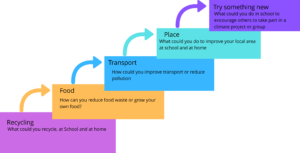
In teams, the students were asked to present their pitch to the assembly and the ‘dragon’ headteachers. They were given the following guide to help them plan:

The teams were also asked to share their presentations with Manchester Council and come back in the future to celebrate all the great work they are doing in their schools.
The event was linked to the council’s Skills for Life project and the intention is to get young people in the region to think about: “How your skills can save the planet”. The diagram below is a handy and colourful guide linking the skills to the activities.
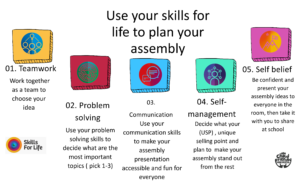 The Way Kloodle is Used
The Way Kloodle is Used
It seems appropriate that the schools and children are encouraged to maintain a digital record of their activities which they can maintain and add to as they progress through school and life, rather than a hard paper copy.
Accounts were set up for the schools attending by simply following the provided link and inputting the school’s email. The children who attended the training on the day received a ‘Climate Champion’ award as a digital certificate, which is displayed on their Kloodle profile (record of achievement) to kick-start their Skills for Life journey.
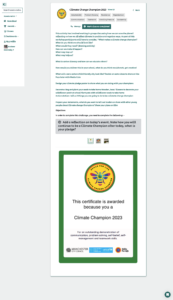
This is time-stamped and is a lasting record of attendance and commitment. Students will be able to add to their profile and continue to build, capture and evidence the skills as they take their Kloodle profile through the journey of life. The potential for successful skill-building was clear from the day’s enthusiasm and work.
If you are from a school in Manchester, and would like your learners to earn their Climate Champion awards, you can do so by registering here: https://kloodle.com/sfl-organisation#/
The experience and skills’ development from enrichment activities at the school can be captured by being recorded on Kloodle during or after each lesson or activity.
Learners do this by uploading photos, videos, documents and blogs to their Kloodle profile, tagging in the skills they are honing as part of the activity. By downloading the Kloodle app to their phones, photos and posts about activities can be recorded quickly as they are completed.
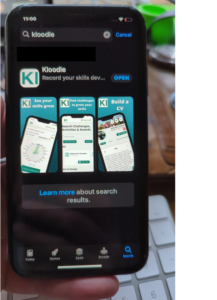 Each individual learner has a skills wheel on their Kloodle profile, which illustrates the growth in skill development. The climate change workshop is an example of a “skills building” opportunity; young people can participate in the activities to develop these skills, with the added incentive of gaining awards, raising confidence and awareness at the same time.
Each individual learner has a skills wheel on their Kloodle profile, which illustrates the growth in skill development. The climate change workshop is an example of a “skills building” opportunity; young people can participate in the activities to develop these skills, with the added incentive of gaining awards, raising confidence and awareness at the same time.
By completing tasks, learners can identify how their aptitudes can grow their individual skills wheel. That feels good!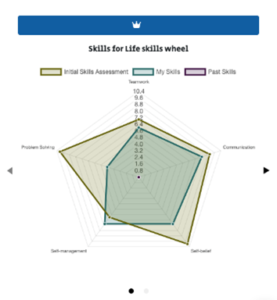
In this way, Kloodle helps young people to build confidence and self-esteem; as their profile grows, they begin to realise they have a lot to offer the world.
Reflection is a very powerful component of the process as young people think more deeply about identifying skills and then how to develop them, so personal reflections can be added to Kloodle after activities, when students consider how their skills have evolved.
And here are some real-life excellent examples of how learners use Kloodle for reflections on climate change:

Conclusions and Next Steps
Manchester is a “progressive and equitable city” and the city council is arranging these types of events and activities to offer opportunities to educate young people in the city about big picture themes which affect their futures. It also helps to link with the issue of developing the skills which can contribute to a fulfilled life. The intention of Manchester City Council is to roll out the Skills for Life programme on Kloodle to all of the schools in the Manchester district so that young people in the vicinity can build confidence, believe their voice will be listened to and that they can make an impact.
If you would like a demo of Kloodle please book it here: Calendar

